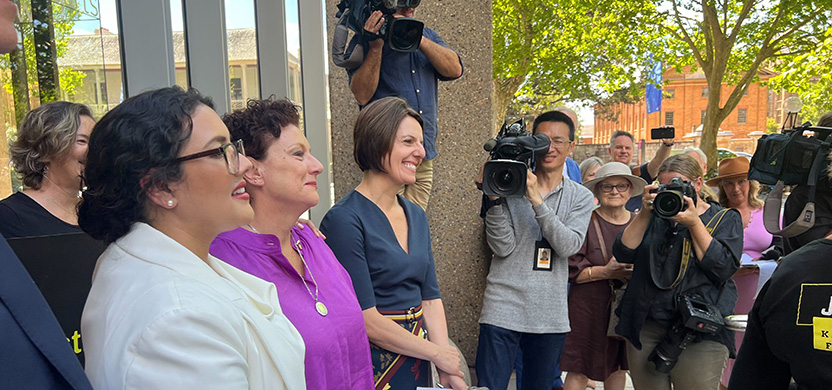Folbigg case: wrongful convictions will continue to occur without major justice system reform
- 3 mins read


Kathleen Folbigg (in purple) with her lawyer Rhanee Rego (left) and Chief Executive of the Australian Academy of Science Anna-Maria Arabia (right) outside the NSW Court of Criminal Appeal after Ms Folbigg’s convictions were quashed.
Australian scientists have welcomed today’s decision by the NSW Court of Criminal Appeal to quash Kathleen Folbigg’s convictions.
While justice has finally been served for Ms Folbigg, wrongful convictions will continue to occur without major reforms to justice systems across Australia.
New genetic evidence available in 2019 played a significant role in bringing about the second Inquiry into Kathleen Folbigg’s convictions and subsequent pardon in 2023; however, basic scientific principles were not upheld from the time of her trial.
For example:
- Kathleen Folbigg was convicted for murdering her children by suffocation, yet there was no pathology-based evidence of suffocation of the children
- medical and pathological evidence was available to indicate natural causes of death of the Folbigg children
- the case against Kathleen Folbigg was premised on an incorrect logic that four children could not die in a family from natural causes unless it was one unifying cause of death
- circumstantial evidence (including non-scientific opinions about Ms Folbigg’s diaries) was given more weight than medical and pathological evidence available at the time of trial
- at the first Inquiry, erroneous interpretation of data held in the International Calmodulinopathy Registry was presented and accepted
- no journalling, trauma or grief experts were given the opportunity to provide expert evidence in a formal legal process until the 2022 Inquiry.
Australia must be open to learning from the gross miscarriage of justice in Ms Folbigg’s case. The Academy’s role in Ms Folbigg’s case has always been to ensure that science is being heard in the criminal legal system.
Our role in this case has reinforced our view that in every Australian state and territory, a more science-sensitive legal system is required.
As a matter of urgency, Australian jurisdictions must adopt a reliability standard to determine the admissibility of evidence.
Until Evidence Acts across the country are amended to introduce a reliability standard, there is a significant risk that unreliable evidence will be admitted into courts. Australia remains well behind other nations in its absence of a legal reliability standard.
When the Academy petitioned the Governor of NSW to pardon Kathleen Folbigg based on additional scientific evidence uncovered by its Fellow, Professor Carola Vinuesa FAA FRS, it took nearly three years for Ms Folbigg to be pardoned.
This unacceptable time delay is because Australia lacks effective post-conviction review mechanisms. In countries such as the United Kingdom, Norway, New Zealand and, most recently, Canada, criminal cases review commissions have been established.
These commissions are independent, dedicated bodies that investigate miscarriages of justice. It is time Australia introduced an independent, transparent and accountable review mechanism. This is particularly important in an age of rapid scientific and technological discoveries.
The Australian Academy of Science acted as an independent scientific adviser to the second Folbigg Inquiry – a unique and rare interaction between a learned academy and a legal system. It assisted by independently recommending experts to assist the Inquiry. This meant that the Inquiry could hear from the best available experts from the relevant scientific disciplines wherever they resided in the world.
A mechanism to enable the courts to routinely hear from independently identified experts who are available to all parties for cross-examination must be found.
The Academy looks forward to working with the Attorneys General across Australia to develop and implement more science-sensitive legal systems.
More information
Read a transcript of the press conference with Australian Academy of Science Chief Executive Anna-Maria Arabia outside the NSW Court of Criminal Appeal.





